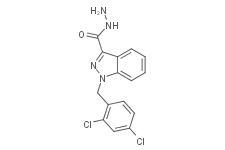
Adjudin
CAS No. 252025-52-8
Adjudin( AF-2364 | AF 2364 | AF2364 | Adjudin )
Catalog No. M17455 CAS No. 252025-52-8
Adjudin is a small molecule compound known to possess antispermatogenic function, attenuates microglia activation by suppression of the NF-κB pathway.
Purity : >98% (HPLC)
 COA
COA
 Datasheet
Datasheet
 HNMR
HNMR
 HPLC
HPLC
 MSDS
MSDS
 Handing Instructions
Handing Instructions
| Size | Price / USD | Stock | Quantity |
| 5MG | 43 | In Stock |


|
| 10MG | 68 | In Stock |


|
| 25MG | 105 | In Stock |


|
| 50MG | 141 | In Stock |


|
| 100MG | 214 | In Stock |


|
| 500MG | 536 | In Stock |


|
| 1G | Get Quote | In Stock |


|
Biological Information
-
Product NameAdjudin
-
NoteResearch use only, not for human use.
-
Brief DescriptionAdjudin is a small molecule compound known to possess antispermatogenic function, attenuates microglia activation by suppression of the NF-κB pathway.
-
DescriptionAdjudin, also known as AF-2364, is a drug which is under development as a potential non-hormonal male contraceptive drug, which acts by blocking the production of sperm in the testes, but without affecting testosterone production. It is an analogue of the chemotherapy drug lonidamine, an indazole-carboxylic acid, and further studies continue to be conducted into this family of drugs as possible contraceptives. A study in 2013 indicated that Adjudin, similar to its analogue lonidamine, has properties that inhibit cancer growth by targeting mitochondria and blocking energy metabolism in certain kinds of tumor cells in mice, indicating that it has potential as a drug for cancer therapy.
-
In VitroAdjudin is a potent blocker of Cl- channels: disrupting Cl- ion transport function results in a decline in sperm capacitation and fertilizing ability in humans in vitro. Adjudin (ADD) is a mitochondria inhibitor. Adjudin is a molecule that mediates adherens junction disruption at the Sertoli-germ cell interface. To investigate the effect of Adjudin on cancer cells, more than ten different types of human or mice cancer cell lines are treated with increasing concentrations of Adjudin and the cell proliferation is measured by the modified MTT assay. Adjudin inhibits cell proliferation in a dose dependent manner in SGC-7901 (human gastric adenocarcinoma cell), MDA-MB-231 (human breast adenocarcinoma cell), Smmc-7721 (human hepatoma cell) and MIA Paca-2 (human pancreatic adenocarcinoma cell) cells. The IC50 of Adjudin is determined to be 58.0 μM, 13.8 μM, 72.3 μM and 52.7 μM against SGC-7901, MDA-MB-231, Smmc-7721 and MIA Paca-2 cells, respectively, after treatment for 24 h. Similar results are obtained in other human and mice cancer cell lines. The IC50 of Adjudin in A549 cells and PC3 cells is 63.1 μM and 93.0 μM, respectively. For WI-38 and BPH-1 cells, the IC50 of Adjudin can be observed at more than 300 μM and 200 μM, respectively, which is about 5 times and 2 times more than that for the cancer cell lines A549 and PC3.
-
In VivoTo determine whether Adjudin can inhibit lung and prostate cancer growth in vivo, the effect of Adjudin is tested in a subcutaneous model of lung and prostate cancer. Human lung carcinoma cells A549 and prostate carcinoma cells PC3 are injected into athymic nude mice subdermally at the lower back site respectively. Mice are then randomized into two treatment groups with similar mean tumor sizes: Adjudin and vehicle (control). Approximately 2 weeks after tumor inoculation Adjudin is injected intraperitoneally once every three days in lung carcinoma cells and every other day in prostate carcinoma cells at 100 mg/kg. Adjudin treatment can be well tolerated in rodent. And Adjudin-treated mice show significant tumor growth inhibition compared with the control group (P<0.0001 in the human lung carcinoma cells A549 and P=0.006 in the prostate carcinoma cells PC3).
-
SynonymsAF-2364 | AF 2364 | AF2364 | Adjudin
-
PathwayOthers
-
TargetOther Targets
-
RecptorOthers
-
Research AreaOthers-Field
-
Indication——
Chemical Information
-
CAS Number252025-52-8
-
Formula Weight335.19
-
Molecular FormulaC15H12Cl2N4O
-
Purity>98% (HPLC)
-
SolubilityDMSO : ≥ 34 mg/mL; 101.44 mM
-
SMILESClc1c(Cn2nc(c3c2cccc3)C(=O)NN)ccc(Cl)c1
-
Chemical Name1-(2,4-dichlorobenzyl)-1H-indazole-3-carbohydrazide
Shipping & Storage Information
-
Storage(-20℃)
-
ShippingWith Ice Pack
-
Stability≥ 2 years
Reference
1. Mruk DD. Trends Endocrinol Metab. 2008 Mar;19(2):57-64.
molnova catalog



related products
-
Triptonoterpene
Triptonoterpene is a natural product found in Tripterygium wilfordii and Tripterygium doianum.
-
2,2′-Dithiodipyridin...
2,2'-Dipyridyl disulfide is a useful reagent for determination of sulfhydryl groups, preparation of amino acid active esters and the thio esters of phosphoric acid.
-
α-Melanocyte Stimula...
α-Melanocyte Stimulating Hormone, acetylated-[D-Val13] (11-13) (MSHa)



 Cart
Cart
 sales@molnova.com
sales@molnova.com


